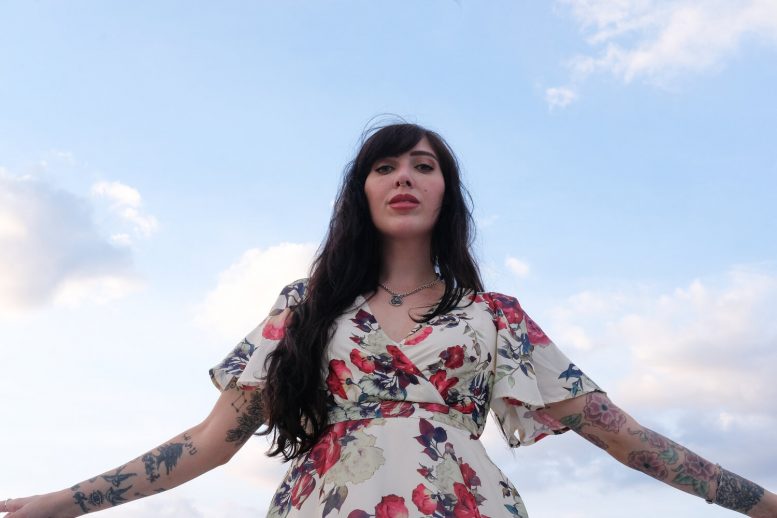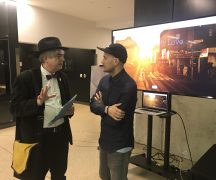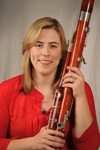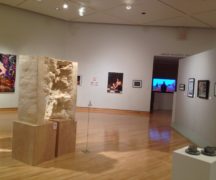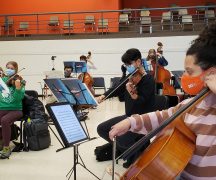By DAVID DUPONT
BG Independent News
As an English major at Ohio State, Ruth Awad came to a crossroads.
Her love of poetry had been cultivated there, and she’d also taken workshops in non-fiction. “For a while I flirted with the idea of being a non-fiction writer but ultimately poetry won out,” Awad said in a recent telephone interview.
Yet much of her work is rooted in history – that of her family, including her father, who fled his homeland of Lebanon during the bitter Lebanese Civil War from 1975-1990, and of Lebanon itself.
In her work, fact comes to life with the music and lyricism that poetry affords. When she writes of her father on the road to Tripoli his “visa warm in his pocket,” she describes the scene: “the sky is already unzipping. The missile already /arching over the freeway.”
Awad will recite poems from her award-winning 2017 collection “Set to Music a Wildfire” and newer poems in a virtual reading Thursday, Oct. 1, at 7:30 p.m. as part of the BGSU Arts Series: The Corona Edition. The reading will be conducted on Zoom.
Awad said the reading will be much like a live reading, though typed comments on the margin, which she enjoys seeing, will replace the interaction of a face-to-face presentation.
“I always try to connect with the audience between poems regardless whether in person or on Zoom. Just some banter that contextualizes what inspired the poem or a little story that kind of dovetails with the poem. That helps to break up the reading a little bit and pique engagement.”
Awad, 33, traces her beginnings as a poet to a gift from her mother, who is a nurse and tattoo artist and “a wild card.” She gave Awad a copy of Sylvia Plath’s collection “Ariel.”
“It’s probably too heavy for a 12-year-old in hindsight, but it really resonated with me. … I started reading more poems,” the writer said.
A seventh grade English teacher picked up on that nascent love of verse and gave her special writing assignments. She wrote her first sonnet then.
“I had the great fortune to have people in my life who really loved poetry and nurtured my love of the craft,” Awad said.
The inspiration of the Ohio State faculty, including the chance to take graduate writing workshops, “fueled my love and interest in poetry” and helped her “find the path forward.”
She went to Southern Illinois University in Carbondale to earn her Master of Fine Arts. That was where her parents had met.
Her mother was born and raised in southern Illinois and met Awad’s father when he was studying at Southern Illinois, an encounter etched with evocative detail in their daughter’s poem “I’d Always Told You Your Father Was the Most Beautiful Man in the World.”
Her father had fled Lebanon in 1976. After splitting his time between England and Lebanon, he came to the United States in the 1980s.
His experience forms the core of “Set to Music a Wildfire.”
“I started learning more about my father’s experience as I was working on my collection because I hadn’t lived or grown up in Lebanon,” Awad said. “Those experiences seemed kind of distant from me and I wanted to bridge the gap in understanding of my cultural history and heritage and my father – who he was as a person.”
She interviewed him. He told her he never thought his children would ever be interested in his story.
She also reached out to some of his friends who grew up with him during the Lebanese Civil War. Awad wanted “to understand how it shaped the country.”
“We‘re still seeing the ramifications of the civil war play out in Lebanon to this day with the way its economy is struggling and the income inequality.”
When she was a child she’d visit family in Lebanon. The last time was right before the Lebanon-Israeli War in 2006, though her father has traveled back since then and family has visits him in the States.
Awad said her family is safe after the explosion that destroyed the port of Beirut in August and left hundreds of thousands homeless. They have been feeling the economic effects, though. “Food scarcity is becoming a real concern.”
Awad’s family lived in the Midwest throughout her life, though they moved because of her father’s job. After her parents divorced, her father got custody of her and her two sisters. At one point the lived in a small Indiana town where “we were definitely the black sheep.”
They never lived any place where there was a significant Lebanese community. She suspects her father stayed in the Midwest because his closest friend, who had left Lebanon with him, had settled in Columbus.
That’s where Awad returned after graduate school because she loves the city.
She has a busy life beyond poetry. She works in marketing for an insurance company. As much as she’d like to “compartmentalize” that day job from her creative work, she sees a connection.
“It’s helped me think about audience, what people need to hear and what order they need to hear it in order to be moved,” she said. “It seeps into helping not only in creating poetry, but also the performance of poems. I pick the poems that will connect with the audience.”
Awad does some work as a tattoo artist.
She is also the devoted companion to three Pomeranians – Bowie, Winnie, and Bub.
“I’m obsessed with them in a way that’s not cute,” she said. “I require their companionship more than they require mine.”
In her new poems, she revisits emotionally troubling places and times of trauma. “The dogs provide emotional support and that keeps you grounded and takes you back to a place of comfort while you’re writing.”
For her “the spark” that ignites the poem “mostly comes from deeply engaging with world around me,” she said. “I read a lot, watch a ton of TV, keep up with the news and have good, thoughtful conversations with friends.”
The cultural moment and the kind of world she envisions are common themes in her work.
“I look out the window a lot , and just get really lost in thought,” Awad continued. “I take a lot of notes.”
She returns to those conversations, those images and those headlines she wants to dig into further.
“Sometimes I’ll have an idea for a poem for so long that by the time I sit down to write, it comes out almost fully formed and pretty polished within 20 minutes,” Awad said. “Other times I have an idea for a poem, and it’s trying to hammer it into shape. It takes months and months and months to figure out why I came to this poem in the first place and what I’m trying to say.
… Usually the more concept heavy poem takes longer for me.”
She’s working on a long poem “about the potential for large scale starvation in Lebanon.”
Long forms, she concedes, are not her strength. “I already know what I’m writing about. It’s like I’m getting in my own way,” she said. “It’s coming out more like a report or article than a poem. How do I get the research in and make it a poem?”
Awad is writing a new book. The work is a departure from her first collection. “The poems are based very much on my own experience,” she said. While they rely less on research, that still plays an important part.
“There’s not this full-fledged narrative arc that we see in ‘Set to Music,’” she said.
“I’m trying to free myself up a little to be more experimental and more lyric in these poems.”
These are less concerned with understanding her father or her family and “more concerned with understanding my own experiences,” Awad said. “I’m writing a lot about grief and assimilation and trauma. Those are the major themes. There’s also climate change poems in there, too, which kind of dovetails with all of those.”

